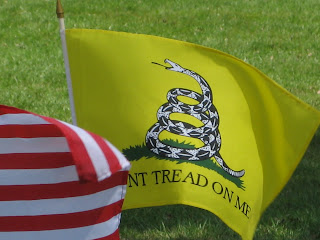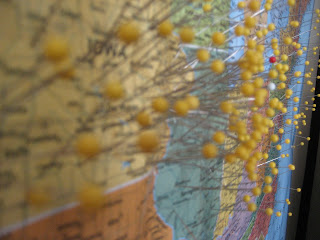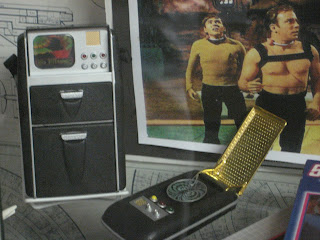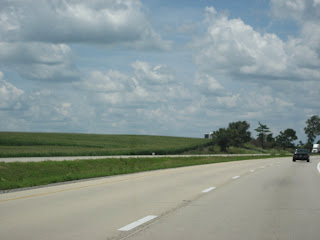
It's funny how images endure, are resurrected, spread -- this yellow flag has its origins, I believe, in a political cartoon of the 18th century (the snake was shown cut up in 13 pieces, to represent the 13 colonies, and the caption was something like "unite or die"). Now it has gained another lease on life as a result of a black conservative man, at a health care town hall in St. Louis, being beaten up by nice open minded liberals as he tried to distribute it.

For the young folks who may not recognize it, this man's red t-shirt, of course, bears the Russian letters for the old U.S.S.R., plus a yellow hammer and sickle.

"The power to do as one pleases." Within limits of the law, of course, but once again I'm reminded of my old professor more than 20 years ago who said something I never forgot. You can have either freedom or equality, he said. You can't have both. If people are free, they are free to be unequal. Equality has to be enforced.

Those leaves in the background give the picture an autumnal look, don't they? It was a bright morning in August. And yet (delicious complication, as Lucia would say) the temperature barely struggled towards 70 F. One of the speakers got a laugh and a round of applause when he mentioned cap and trade, the bill designed to tax us all into protecting ourselves from Global Warming.

Podium and bunting on a summer day -- any 19th (or 18th) century American would feel at home.
This American Liberty Rally/Tea Party was organized in only four days by a local woman maddened by the orchestrations of our Congressional Representative's town hall health care meeting earlier in the week. Rep. Jesse Jackson Jr. (D -- 2nd district) hosted a tightly controlled town hall on Tuesday night, August 18th, at a church at 113th and Halsted Streets, just about the roughest Chicago neighborhood he could find for the occasion. This lady went anyway, brought and submitted six questions, and heard none of them answered. So she came home, did some web surfing and some telephoning, and by Saturday morning, August 22nd, had a park permit (I presume), four speakers lined up to talk about health insurance and sundry matters, a podium, microphone, bunting, electric generator, and a press release on the website of the local advertising circular, The Shopper, inviting all to come.
Between 65 and 70 people (I counted, twice) arrived at 11 am to chat, listen to speeches, and buy a flag or a pin from the young man walking around selling them. The keynote speaker for the morning was Kimberley Fletcher, an army wife and mother of eight who founded the group Homemakers for America and who, almost more importantly, had stories of horror and absurdity to tell of coping with government run health care via the Veterans' Administration. (If they haven't got a slot for your appointment today -- and an anonymous secretary on the phone riffles through tables and charts of illnesses and protocols to find out -- then whatever your problem is becomes an "emergency." But my son only has an ingrown toenail ... Take him to the emergency room.) She drove in from Ohio to tell her stories.
And Mrs. Fletcher is responsible, it seems, for launching something interesting called the Abigail Adams Project. She wants to create a database of all elected officials in the United States, from President to local school board officials, listing simply the official's name and philosophical stances on pertinent issues. She believes that the time ought to have arrived long since by which we vote for candidates based on their stated policies and views, not on party affiliation. Like many frustrated voters she considers both parties to be twin channels of corruption and meaninglessness. And like any voter, she is looking forward -- not literally, but we all have this image in our minds, I suppose -- to an ideal world in which representatives elected to office on the strength of their freely revealed thoughts and beliefs then get together in hallowed halls to hash out difficult problems honestly for the good of the nation. Maybe that would be good. But there was a time when voting for a personality was considered childish in itself; ten thousand personalities are a much slipperier proposition, much harder to hold to account, that one or two parties which have a stake in maintaining a sort of brand name regarding the philosophies and plans you'd like to vote for.
Still, I give this woman great credit for embarking on her apparently new life of activism, and I give our civilization great credit for producing her. What I also find remarkable and encouraging is the level of awareness at which ordinary people, or at least those interested enough to come to a political rally, are now operating. Both speakers and audience knew what TARP, the stimulus bill, cap and trade, and "spending our future" meant. Speakers who linked the War on Poverty to liberalism to socialized medicine to waste and incompetence also got a burst of assenting applause. That's new. Mrs. Fletcher went further back in time, giving a rather long speech in which she referenced both Lenin and Hitler, and this was interesting too. Seventy years on, we are having to identify Hitler in a new way, not as the genocidal monster of the last years of the war, whom our fathers and grandfathers cornered in a bunker in 1945, but as the socialist politician and cult idol he was long before that. His image belongs beside Lenin, Stalin, Che, and Mao, for ideological reasons, not just because all were vicious; my guess is that it's Jonah Goldberg's Liberal Fascism which has gone far toward correcting the misconception that Nazis were "from the right." Gone far, then, toward reviving conservatism and giving people a truth to fight with, particularly against those who are so fond of announcing (when it serves them) that there is no truth but only differing perspectives. And anyway, -- no. The Duke of Wellington was from the right. Samuel Johnson, with his firm belief in "subordination," was from the right. These were men who believed that we none of us are capable of civilized human living outside a proper and God-ordained monarchy. Even the most conservative people today don't operate on that side of the real old-fashioned political divide.
Later in the weekend I went to a party and heard differing reactions to political and economic matters. Some people still talk blithely about insurance and future medical needs, as if the world may not turn upside down with a Congressional vote in September. One lady exulted in the fact that European countries give their citizens a stipend to cope with the expenses of a gluten-free diet. "Oh, but of course their health care sucks. Right," she fumed. It was a party, so I didn't like to ask where she thinks the money for the stipend comes from. And the men in the house talked about the construction industry simply waiting, waiting, to get moving. Projects lined up, permits signed, backhoes ready, everything "dialed in." But no lending from the banks. An economy waiting, waiting ... for what?
To see what damage our leaders can do to us first, it seems, in the quest for abstract fairness and orchestrated, collective justice. Only when they're done will we know how to cope. The Duke of Wellington would probably have said "go" by now.






























































